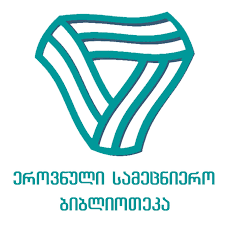გთხოვთ, გამოიყენოთ ეს იდენთიფიკატორი ამ ერთეულის ციტირებისთვის ან ბმულისთვის:
https://openscience.ge/handle/1/1289| DC ველი | მნიშვნელობა | ენა |
|---|---|---|
| dc.contributor.advisor | კუპრაშვილი, ნათია | ka |
| dc.contributor.author | გოგალაძე, მარიამ | ka |
| dc.date.accessioned | 2020-01-10T07:42:14Z | - |
| dc.date.available | 2020-01-10T07:42:14Z | - |
| dc.date.issued | 2017 | - |
| dc.identifier.uri | https://openscience.ge/handle/1/1289 | - |
| dc.description.abstract | Ethnic minority represents the part of the Georgian society which is rejected by majority the population. Even though ethnic majority and minorities were living together during the centuries, their social, cultural and political connection is not happening. All of this is caused by the stereotypes and stigmas in the masses. For the integration of minority, one of the most important ways is to create the suitable media environment, provide the intensive news coverage about them, and then spread the information through minority using their own language. Despite the progress, the ethnic minorities are still in marginalized condition. International organizations put ethnic minorities in an important place, within the list of obligations of the democratic country. Despite that, there is no balanced media environment in Georgian reality. The studies about the ethnic minorities news coverage in media are very poor, and I consider that in my work: “Reflection of the Ethnic Minorities in New Media”. I think, the facts highlighted in the work will show the clear picture of the reality of the news coverage about the ethnic minority in Georgian internet and news media. In my work, I observe that there is the less interest towards the minorities from the media organizations, as well as from government, non-governmental organizations and ombudsmen or other human rights advocates. Observations show that journalists pay less attention to problematic issues, there is no systematic coverage of the facts and news are fragmented. Nowadays, media plays a big role in forming public opinion. Due to lack of national sources, the minorities get all the information from the foreign media, which further alienates them from Georgian society. | en |
| dc.description.abstract | ეთნიკური უმცირესობა ქართული მოსახლეობის იმ ნაწილს წარმოადგენს, რომელიც საზოგადოებისგან გარიყულია. საუკუნეების განმავლობაში ერთობლივი თანაცხოვრების მიუხედავად, ვერ ხდება მათი სოციალური, კულტურული და პოლიტიკური დაკავშირება უმრავლესობასთან. ყოველივე ამას, განაპირობებს მასებში სტიგმების და სტერეოტიპებისადმი, კვლავინდებური ნდობა და ინტერესი. უმცირესობის ინტეგრაციისათვის ერთ-ერთი მნიშვნელოვანი გზაა, ხელსაყრელი მედია გარემოს შექმნა, მათ შესახებ სიახლების ინტენსიური გაშუქება და ინფორმაციის უმცირესობის ენაზე გავრცელება. მიუხედავად წინ გადადგმული ნაბიჯებისა, ეთნიკური უმცირესობები კვლავ, მარგინალურ მდგომარეობაში რჩებიან. მსოფლიო ორგანიზაციები, დემოკრატიული ქვეყნის ვალდებულებათა ნუსხაში, ეთნიკური უმცირესობების ინტეგრირების საკითხს, მნიშვნელოვან ადგილზე აყენებს. მიუხედავად ამისა, დაბალანსებული მედია გარემო ქართულ რეალობაში არ არსებობს. ეროვნული უმცირესობის საკითხის გაშუქებაზე მედიაში, ძალიან მწირი კვლევები არსებობს და ვთვლი, რომ ჩემი ნაშრომი „ეთნიკური უმცირესობის ასახვა ახალ მედიაში“, შესაძლოა, საინტერესო იყოს. ნაშრომში გამოკვეთილი საკითხები, ვფიქრობ დაგვანახებს ნათელ სურათს, თუ რა ხდება დღეს, ინტერნეტმედიაში უმცირესობის გაშუქბის მიმართულებით. მედია მონიტორინგის შედეგად, გამოვლინდა უმცირესობების მიმართ ნაკლები ინეტერესი, როგორც მედია ორგანიზაციების მხრიდან ასევე ზოგადად ხელისუფლების, არასამთვარებოებისა და სახალხო დამცველისგან. დაკვირვებამ, ცხადყო, რომ ჟურნალისტები ნაკლებ ყურადღებას ანიჭებენ, პრობლემურ საკითხებს, არ ხდება ფაქტების სისტემატიზაცია და სიახლეები ფრაგმენტულია. დღეს, მედიას უდიდეს როლი უკავია საზოგადოებრივი აზრის ჩამოყალიბების მხრივ. უმცირესობები კი ძირითადად ინფორმაციას უცხოური მედია საშუალებებიდან იღებენ, რაც მათ უფრო მეტად აშორებს ქართულ საზოგადოებას. | ka |
| dc.format.extent | 54 გვ. | ka |
| dc.language.iso | ka | en |
| dc.publisher | Ivane Javakhishvili Tbilisi State University | en |
| dc.publisher | ივანე ჯავახიშვილის სახელობის თბილისის სახელმწიფო უნივერსიტეტი | ka |
| dc.subject | ეთნიკური უმცირესობები საქართველოში | ka |
| dc.subject | მაუწყებლობების ანალიზი | ka |
| dc.subject | ახალი მედია და მისი როლი | ka |
| dc.subject | მედიის თვითრეგულირების სტანდარტი უმცირესობის გაშუქებისას | ka |
| dc.title | ეთნიკური უმცირესობების ასახვა ახალ მედიაში | ka |
| dc.type | master thesis | en |
| dc.type | სამაგისტრო ნაშრომი | ka |
| thesis.degree.name | ჟურნალისტიკის მაგისტრი | ka |
| thesis.degree.level | 1 | - |
| thesis.degree.discipline | მედია და ახალი ტექნოლოგიები. Media and New Technology | ka |
| thesis.degree.grantor | ივანე ჯავახიშვილის სახელობის თბილისის სახელმწიფო უნივერსიტეტი | ka |
| dc.contributor.institution | Ivane Javakhishvili Tbilisi State University | en |
| dc.contributor.institution | ივანე ჯავახიშვილის სახელობის თბილისის სახელმწიფო უნივერსიტეტი | ka |
| dc.contributor.faculty | Faculty of Social and Political Sciences | en |
| dc.contributor.faculty | სოციალურ და პოლიტიკურ მეცნიერებათა ფაკულტეტი | ka |
| item.languageiso639-1 | ka | - |
| item.cerifentitytype | Publications | - |
| item.cerifentitytype | Publications | - |
| item.openairetype | master thesis | - |
| item.openairetype | სამაგისტრო ნაშრომი | - |
| item.openairecristype | http://purl.org/coar/resource_type/c_bdcc | - |
| item.openairecristype | http://purl.org/coar/resource_type/c_18cf | - |
| item.fulltext | With Fulltext | - |
| item.grantfulltext | open | - |
| ჩანს კოლექციებში: | სოციალურ და პოლიტიკურ მეცნიერებათა ფაკულტეტი (დისერტაციები, სამაგისტრო ნაშრომები) | |
ფაილები ამ ერთეულში:
| ფაილი | აღწერა | ზომა | ფორმატი | |
|---|---|---|---|---|
| MA Thesis Mariam gogaladze axteq.pdf | ეთნიკური უმცირესობების ასახვა ახალ მედიაში | 685.09 kB | Adobe PDF | დათვალიერება-გახსნა |
CORE Recommender
გვერდის დათვალიერება
157
checked on May 18, 2024
გადმოწერა
596
checked on May 18, 2024
Google ScholarTM
გადამოწმება
ერთეულები ციფრულ საცავში დაცულნი არიან საავტორო უფლებით, ყველა უფლების დაცვით, თუ სხვაგვარი რამ არაა მითითებული.

